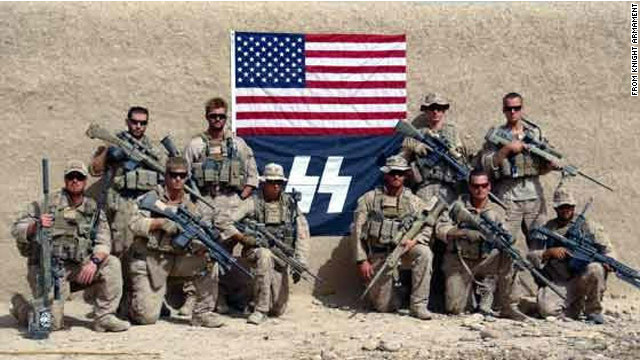Edward
Bartender
- Messages
- 25,381
- Location
- London, UK
I've always been creeped out by "reenactor" Nazis, to be honest. I realize somebody has to be the Bad Guys at reenactments, but I just can't get the YOU'RE PRETENDING TO BE SOMEONE WHO FOUGHT FOR HITLER thing out of my mind. I think it trivializes what those uniforms stood for, and I don't support it by attending such events.
I remember being a kid and seeing other kids playing Army around the neighborhood with cut-out paper swastika armbands because the Nazis they'd seen on TV had "the best uniforms." I've always kind of felt that modern collectors of Nazi memorabilia must be stuck in a bit of that mindset.
Very much so, imo. Mind you, a sizeable chunk of the allied reenactors aren't any more evolved, taking a very similar 'cool comic book' attitude to the whole thing. I've got no real issue with reenactment, captin' where it perpetuates the rose-tinted view of the war as a great time in history, when people were Better and All Stuck Together and other such mythology. Maybe I listened to much to the experiences of folks I knew who lived through it. I do worry about how it's all going to be celebrated when they're gone. The way the WW1 centeenary has been celebrated in some corners (now Harry Patch is gone and can't speak out against it) doesn't bode well for WW2 as it passes from living memory.
Though I tend to think that many Asians have only an abstract knowledge of Hitler, Nazism and the Holocaust considering it part of what is to them a very distant "European history."
Given how little the average peson in the West knows about, say, Chinese history and Chinese conflict with Japan, it's not really hard to imagine it the other way around. The Holocaust comes up as a factor in my privacy law class in Beijing every year, as W. Germany was the first state in Europe to have a data protection law, and it was a direct cultural response to the horror of the Nazi genocide. Many who ended up in the extermination camps were selected to go there by using the state's census records to establish who was a Jew and so on. Data protection law was designed, in its origins, as a mechanism to prevent such abuse of personal information as the Nazis committed. Few of the Chinese kids I teach seem to have any significant prior knowledge of the Holocaust, as European history isn't much emphasised in their education.
But this again brings up an interesting point- why is it ok for people in the west to enjoy 'living history' or 're-enactment' as nazis, but we find it creepy and repulsive when asians do it? I personally thinks it's about context (easy to prove- not many re-enactors go out for a night on the town dressed as nazis) and intent (more difficult to prove- who knows how many nazi re-enactors are getting their jollies at events way more than some kid in Tokyo?).
I suppose we could build a case for historical accuracy, but it's a fair point that at these events people are often in a uniform just as a costume, rather than re-enacting any particular unit or event with a modicum of educational benefit. What I feel rather crosses a line are when you see photos of people at events in the US who've come dressed as Wehrmacht or SS, and have their kids dressed up as Hitler Youth. That's where it crosses the line, imo, into fancy dress, and starts to get really questionable.
I think people are a bit more sensitive about these things in the UK than perhaps I get the impression is always the case in the US, but that may not always be so. The interesting thing though is that I find some things become more and more culturally verboten the further we are from the war. A few years ago, one of the younger royals in the UK went to a party in an Afrkia Korps uniform (with an erroneously added Nazi armband; perhaps that was from the Allgemein SS uniform that, according to the hire shop, he'd really wanted but couldn't fit into. The theme of the party was "Colonials and Natives."). There was tabloid outrage. Back in the seventies and even the early eighties, several comedians in the UK wore SS uniforms in various character settings. Stan Boardman and the likes. Allo Allo was a much gentler, less questionable variation, but both were rooted in the wartime British humour of mocking your enemey in order to disempower his ability to affect morale. Interesting how this has evolved and varied as the war becomes more distant. Of course (as is all too often forgotten these days), during the war, ordinary people (and the majority of the military) knew nothing about the death camps....
The thing I keep coming back to in my head is that it's 'acceptable' for Americans to dress up as nazis for re-enactment/living history ('My grandfather died for my freedom to dress up as a nazi!'), but NO ONE makes concentration camp inmate uniforms, and no one wants to 'living history' that, and if they did, I'm pretty sure they would be pilloried for being disrespectful, so I think somewhere we got our values all mixed up.
Folks do tend to distinguish those who fought in combat with those who ran the camps. Me, well. I've got all the tim in the world for the poor bugger conscripts who fought in the war because the papers came thorugh the door and they didn't want shot for declining. Not so keen on the volunteer, gung-ho types.



